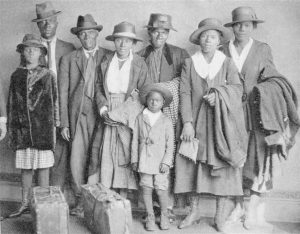(Akiit.com) Every year the Association for the Study of African American Life and History (ASALH) choses a theme for Black History Month. This year they have chosen, Black Migrations emphasizing “the movement of people of African descent to new destinations and subsequently to new social realities.” Their theme is important, especially when we think of the “Great Migration”, the time after World War I when Black folk fled the oppressive south looking for a new reality.
Why not flee? Black men were lynched in their uniforms when they came back into enslavement-type realities even as they embraced a country that did not appreciation them. Just a few years after Black men returned from World War I, white people in Tulsa, Oklahoma, so jealous of African American economic accomplishment, torched the 30 block Black-owned Greenwood community on a pretense. Nowhere to run, nowhere to hide from virulent racism.
And yet, Black folks had mobility. Often, we came together to create community. We left oppressive spaces to find new ones that were only marginally less oppressive. As ASALH puts it, “African  American migration patterns included relocation from southern farms to southern cities; from the South to the Northeast, Midwest, and West; from the Caribbean to US cities as well as to migrant labor farms; and the emigration of noted African Americans to Africa and to European cities, such as Paris and London, after the end of World War I and World War II.”
American migration patterns included relocation from southern farms to southern cities; from the South to the Northeast, Midwest, and West; from the Caribbean to US cities as well as to migrant labor farms; and the emigration of noted African Americans to Africa and to European cities, such as Paris and London, after the end of World War I and World War II.”
Here’s what it means – Black folks were moving, migrating, making it happen, grasping at reality and opportunity despite every barrier. Black folks moved because they were looking for safe places to survive and thrive, to enjoy life despite the racial obstacles that were thrown at us. Black folks moved because movement was preferable to standing still. We moved because we had to.
At the same time, migration is not only about a movement of space, but also about a movement of mindset. The Mississippi men and women who moved to Chicago had to change the way they chose to encounter the world. They had to move from being sharecroppers to being entitled voters. Their movement changed the way that politics and economics influenced major cities. Even though their movement did not necessarily result in “fairness”, their movement and their changed participation made things far more fair, and the political process somewhat more representative.
Migration. Movement. Mobilization. A shifting of the brain. A shifting of the heart. While ASALH would like us to focus on the physical migration that happened in the 20th century, I would also like us to focus on the necessary heart migration that must take place to propel us through the 21st century. Our Black History Month story can’t simply be a story of the ways we moved to accommodate economic shifts, but it must also be a story of the ways we have moved our hearts.
?What do we mean when we say Black community? What do we mean when we embrace the theme of “migrations”? Are we aware of the rigors our people experienced when they moved South to North? Do we honor them with our presence?
I never had the opportunity to meet Dr. Sadie Tanner Moselle Alexander, but because she was the first African American woman to receive the Ph.D. in economics (and one of the three who were the first to receive the degree on the same weekend), I feel a bond with her and have written about her life and her career. She wrote about migration, about the folks who came from the South to cities like Philadelphia to find a space for themselves. She wrote about the many ways cities were unwelcoming to new residents. She wrote then, like we might write now, about the many ways our urban landscape changes with mobility and migration.
In choosing Black Migrations as a Black History Month theme, ASALH has chosen to examine the mobility that is part of African American life in this country. We move because we want safer space and place. We move because we flee structural danger. We move because we are African and American and moving is part of our DNA.
We move. We migrate. We seek the best that our nation has to offer, and when it does not provide what we need, we move, and we move again!
Columnist; Julianne Malveaux
FB Page; http://facebook.com/julianne.malveaux









Leave a Reply